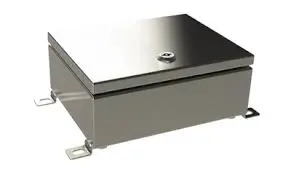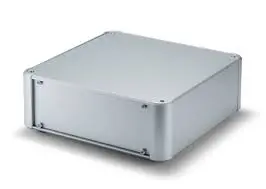Can Sheet Metal Cases be customized?
2025-02-26 09:06:37
Sheet metal cases have become increasingly popular in various industries due to their versatility, durability, and cost-effectiveness. Many businesses and individuals wonder about the customization options available for these cases. This blog post delves into the world of sheet metal case customization, exploring the possibilities, benefits, and considerations when tailoring these cases to specific needs. We'll discuss the various materials, design options, and manufacturing processes that allow for personalized sheet metal cases, as well as the advantages of choosing customized solutions over standard off-the-shelf products.

The Versatility of Sheet Metal Case Customization
Material Selection for Customized Sheet Metal Cases
When it comes to customizing sheet metal cases, the choice of material plays a crucial role in determining the final product's characteristics. Manufacturers offer a wide range of materials, each with its unique properties and benefits. Stainless steel, for instance, is renowned for its corrosion resistance and sleek appearance, making it ideal for cases exposed to harsh environments or those requiring a polished look. Aluminum, on the other hand, is prized for its lightweight nature and excellent heat dissipation properties, making it perfect for cases housing electronic components or those requiring portability. For applications demanding higher strength-to-weight ratios, titanium sheet metal can be an excellent choice, albeit at a higher cost. Galvanized steel offers a cost-effective solution for cases that need protection against rust and corrosion. The ability to choose from these diverse materials allows customers to tailor their sheet metal cases to specific requirements, ensuring optimal performance and longevity in their intended applications.
Customizable Dimensions and Shapes
One of the most significant advantages of opting for customized sheet metal cases is the flexibility in dimensions and shapes. Unlike standard cases, custom solutions can be tailored to exact specifications, accommodating unique equipment or components with precision. This level of customization is particularly valuable in industries where space optimization is crucial, such as aerospace or telecommunications. Manufacturers can create cases with complex geometries, including rounded corners, tapered sections, or asymmetrical designs, to meet specific functional or aesthetic requirements. Advanced computer-aided design (CAD) software allows for precise modeling of these custom shapes, ensuring that the final product meets the client's exact specifications. This capability to create bespoke dimensions and shapes not only enhances the functionality of the case but also contributes to a more streamlined and professional appearance of the enclosed equipment.
Surface Finishing Options
The customization of sheet metal cases extends beyond shape and size to include a variety of surface finishing options. These finishes serve both aesthetic and functional purposes, allowing customers to further tailor their cases to specific needs. Powder coating, for example, offers a durable and attractive finish that can be applied in virtually any color, enabling brand consistency or color-coding for easy identification. For cases requiring enhanced corrosion resistance, anodizing is an excellent option, particularly for aluminum cases. This process creates a hard, porous surface that can be dyed in various colors while significantly improving the metal's durability. Brushed or polished finishes can give cases a sophisticated, high-end appearance, ideal for consumer-facing products or luxury applications. Additionally, specialized coatings can be applied to improve EMI/RFI shielding, crucial for cases housing sensitive electronic equipment. These diverse finishing options ensure that customized sheet metal cases not only meet functional requirements but also align with branding and aesthetic preferences.
Advanced Manufacturing Techniques for Custom Sheet Metal Cases
Precision Cutting and Forming
The creation of customized sheet metal cases relies heavily on advanced cutting and forming techniques. Laser cutting technology has revolutionized the manufacturing process, allowing for intricate designs and precise cutouts with minimal material waste. This technology enables manufacturers to create complex patterns, ventilation holes, and custom openings for connectors or displays with unprecedented accuracy. Computer Numerical Control (CNC) punching and nibbling machines offer another level of precision, particularly useful for creating standardized holes and shapes in high-volume production runs. For forming the sheet metal into the desired shape, techniques such as press brake forming and roll forming are employed. These methods allow for the creation of sharp bends, curves, and complex geometries that define the overall structure of the case. The combination of these cutting-edge manufacturing techniques ensures that each customized sheet metal case meets exact specifications, regardless of its complexity.
Welding and Assembly Innovations
Welding plays a crucial role in the fabrication of customized sheet metal cases, particularly for cases requiring high strength and durability. Advanced welding techniques such as laser welding and resistance spot welding allow for precise, strong joins with minimal distortion. These methods are especially beneficial for thin sheet metal, where traditional welding might cause warping or damage to the material. In addition to welding, innovative assembly methods are employed to create customized cases. Mechanical fastening techniques, including riveting and clinching, offer alternatives to welding for certain applications. These methods can be particularly useful when disassembly may be required in the future or when working with dissimilar metals. Adhesive bonding is another technique gaining popularity, especially for applications where weight reduction is crucial or where a seamless appearance is desired. The choice of assembly method is carefully considered based on the specific requirements of each custom case, ensuring optimal performance and longevity.
Integration of Smart Features
The customization of sheet metal cases has evolved beyond mere physical attributes to include the integration of smart features. This advancement allows cases to not only protect and house equipment but also to actively contribute to its functionality. For instance, custom cases can be designed with built-in cooling systems, including strategically placed vents, fans, or even liquid cooling channels, to manage heat dissipation effectively. Furthermore, manufacturers can incorporate sensors and monitoring systems directly into the case structure. These can include temperature sensors, humidity detectors, or impact sensors that provide real-time data on the conditions inside and around the case. For applications requiring enhanced security, customized cases can be equipped with electronic locks, RFID access controls, or biometric authentication systems. The integration of LED indicators or small display screens can also be part of the customization, providing visual feedback or important information about the enclosed equipment. These smart features transform sheet metal cases from passive enclosures into active components of the overall system they protect.

Benefits and Considerations of Custom Sheet Metal Cases
Enhanced Protection and Performance
One of the primary advantages of opting for customized sheet metal cases is the enhanced protection and performance they offer. By tailoring the case to the exact specifications of the equipment it will house, manufacturers can ensure optimal fit and protection against environmental factors such as dust, moisture, and physical impacts. This precise customization minimizes wasted space, reducing the overall footprint of the equipment while maximizing protection. Custom cases can also be designed with specific performance requirements in mind. For instance, cases for electronic equipment can be engineered with enhanced EMI/RFI shielding properties, protecting sensitive components from electromagnetic interference. Similarly, cases for outdoor use can be designed with superior weatherproofing features, including specialized seals and coatings. This level of customization not only protects the enclosed equipment but can also extend its lifespan and improve its overall performance, making it a valuable investment for businesses across various industries.
Cost-Effectiveness in the Long Run
While the initial cost of customized sheet metal cases may be higher than off-the-shelf alternatives, they often prove more cost-effective in the long run. Custom cases are designed to fit specific equipment perfectly, eliminating the need for additional padding or modifications that might be necessary with standard cases. This precise fit can lead to reduced shipping costs, especially for businesses that frequently transport their equipment. Moreover, the durability and tailored protection offered by custom cases can significantly reduce the risk of equipment damage during transport or operation. This translates to lower repair and replacement costs over time. For businesses with unique or specialized equipment, custom cases can also improve operational efficiency by incorporating features that facilitate easy access, maintenance, or integration with other systems. When considering the total cost of ownership, including factors like equipment longevity, operational efficiency, and reduced risk of damage, customized sheet metal cases often represent a smart financial decision.
Design Considerations and Challenges
While the benefits of customized sheet metal cases are numerous, there are several design considerations and challenges to keep in mind. One of the primary challenges is balancing customization with manufacturability. Highly complex designs may require specialized tooling or manufacturing processes, potentially increasing production time and costs. It's crucial to work closely with experienced manufacturers who can provide guidance on design optimizations that maintain functionality while ensuring efficient production. Another consideration is the need for future flexibility. While a custom case may be perfect for current needs, businesses should consider potential future requirements or equipment upgrades. Designing cases with some degree of adaptability or modularity can help extend their usability over time. Additionally, regulatory compliance is a critical factor, especially for cases used in industries with strict standards, such as medical or aerospace. Ensuring that custom designs meet all relevant regulations and certifications is essential. Lastly, the balance between aesthetics and functionality must be carefully managed, particularly for cases that will be customer-facing or represent a company's brand.
Conclusion
Customized sheet metal cases offer a myriad of benefits, from enhanced protection and performance to long-term cost-effectiveness. The ability to tailor every aspect of the case, from materials and dimensions to smart features and finishes, allows businesses to create solutions that perfectly meet their unique needs. While challenges exist in the design and manufacturing process, partnering with experienced manufacturers can help navigate these complexities, resulting in high-quality, bespoke cases that add value to any application. If you want to get more information about this product, you can contact us at info@qdkshd.com.
References
1. Smith, J. (2022). "Advanced Manufacturing Techniques for Custom Sheet Metal Fabrication"
2. Johnson, A. (2021). "Material Selection for Industrial Enclosures: A Comprehensive Guide"
3. Brown, R. (2023). "Smart Features in Modern Sheet Metal Cases: Trends and Applications"
4. Lee, S. (2022). "Cost-Benefit Analysis of Custom vs. Standard Enclosures in Industrial Settings"
5. Garcia, M. (2023). "Design Considerations for EMI/RFI Shielding in Sheet Metal Cases"
6. Taylor, E. (2021). "Innovations in Surface Finishing for Metal Enclosures"
Send Inquiry
You may like
